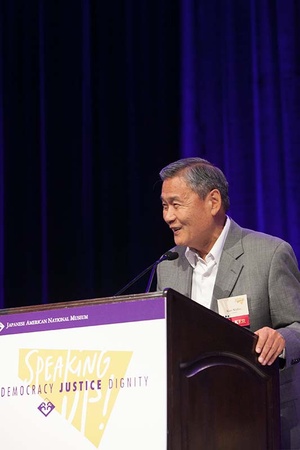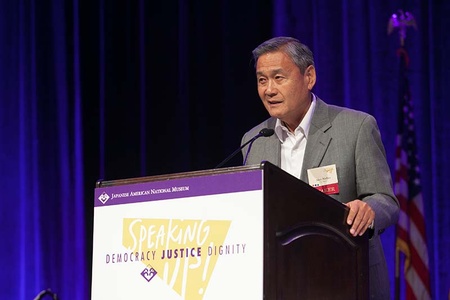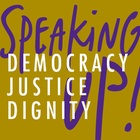I was born in Manzanar on August 9, 1945, the day that the United States dropped a second atomic bomb on Nagasaki, Japan. Three days earlier, the United States had dropped the first atomic bomb on Hiroshima, where my grandfather died as a result of the bomb.
Like many of you here, I came of age in the 1960s. In my first year at UC Berkeley, I became involved in the Free Speech Movement, and then later became involved in the Civil Rights Movement, the movement against the Viet Nam War, and also the fight for ethnic studies and educational opportunity programs on our nation’s campuses.
These activist roots have continued for the past fifty years and I am fortunate to have been involved throughout my life in movements for change and to see the impact that being part of a movement can have on changing society: redress; civil rights; educational rights; community preservation and development.
These involvements have formed my identity. This involvement has given me an appreciation for the power of grassroots movements and the ability of individuals working together to create social change. It is within this context that I join you in commemorating the 25th anniversary of the Civil Liberties Act of 1988.
My participation in the campaign for redress and reparations was a highpoint of my life’s involvement. As a co-founder and member of the National Coalition for Redress/Reparations in 1980, I had the opportunity to work with a dedicated group of grassroots volunteers in being a part of the redress campaign. A number of NCRR members are at this conference and continue their work in civil liberties and human rights issues as Nikkei for Civil Rights and Redress in Los Angeles.
The passage of the redress legislation was a victory for our community as we came together to unite for a common goal. It reaffirmed the principles of civil liberties for our society as our nation acknowledged that a grievous wrong had been committed against Japanese Americans unjustly incarcerated due to racism, wartime hysteria, and a failure of political leadership.
The winning of redress was not easy. Japanese Americans were a small group and there was very little knowledge about the camps amongst younger Nikkei as well as most other Americans. First, we were working against precedence in compelling the government to formally acknowledge past wrongs and provide redress. Second, we faced opposition from outspoken critics who either did not believe in the necessity of reparations or denounced the incarceration experience as falsehood. Third, even those in agreement of pursuing redress harbored different ideas of how they should proceed. Despite these obstacles, our community came together, shared our story, united with other civil liberties-minded groups and individuals, and achieved victory.
We must recognize the many who were a part of the redress campaign. Victory was not due to any one organization or individual. It was a victory for a community who came together with one voice to tell our story and seek justice.
It is fitting to be in Seattle, where much of the early discussions regarding redress began with the Seattle Evacuation and Redress Committee and where the first Day of Remembrance program was held in 1978.
Many organizations were an instrumental part of the success of redress. The Japanese American Citizens League, the National Council for Japanese American Redress, the National Coalition for Redress/Reparations, and the legal team that successful represented Gordon Hirabayashi, Fred Korematsu, and Minoru Yasui in getting their convictions overturned.
The presence of respected Nikkei elected officials in Congress was critical to the passage of redress. We were fortunate to have members of Congress who could speak directly from their experiences about what happened to Japanese Americans during World War II. We are deeply indebted to Senators Daniel Inouye and Spark Matsunaga as well as Congressmen Robert Matsui and Norman Mineta for their leadership.
There was also the dedicated behind-the-scenes work of so many individuals who worked tirelessly with little recognition in helping to build the case for redress: individuals like Michi Nishiura Weglyn, whose book, Years of Infamy, outlined the basis for redress, and Aiko Yoshinaga-Herzig, whose tireless research in the National Archives discovered an original “final report” that served as a basis for seeking an overturning of the three court cases.
We celebrate the efforts of a community. We affirm the ability of individuals to create change. It was a victory for civil liberties-minded individuals.
As we commemorate the 25th anniversary of this historic legislation, we must remind ourselves that we fought for redress not only to vindicate our community, but also to educate the nation about what can happen when the civil liberties of a group are denied in the name of national security. We must use the Civil Liberties Act of 1988 as a reminder of the always delicate balance between civil liberties and security, especially during times of crisis. We must recall the historic quote written by Benjamin Franklin in 1775 during our nation’s founding: “They that can give up essential liberty to purchase a little temporary safety, deserve neither liberty nor safety.”
The political environment today, as we have lived through 12 years of the Post 9/11 so-called “War on Terror,” should give us pause as to how we are balancing civil liberties during what has been, and will continue to be, a prolonged period of threats to national security. The signing of the 2012 National Defense Authorization Act (NDAA), authorizes the U.S. military to arrest and indefinitely detain anyone, including American citizens on U.S. soil, without a warrant or due process if the military simply suspects them of supporting terrorism. This is exactly what the U.S government did in 1942 to 120,000 Japanese Americans who spent years in prisons without notice of charges, the right to an attorney, or the right to a trial. For this reason, on December 17, 2012, the families of Fred Korematsu, Minoru Yasui, and Gordon Hirabayashi filed an amicus brief in the lawsuit that challenges the constitutionality of a provision of the NDAA.
In 2011, Congress passed a four-year extension of the Patriot Act that was enacted soon after 9/11. This extension continued with its expanded definitions of terrorism and domestic terrorism. It also continued policies regarding surveillance and wiretapping and stored communications like voicemail that have been highlighted with the recent release of documents by Edward Snowden.
While the provisions of both of these acts focus on foreign terrorists, they have been applied domestically to track individuals and groups suspected of aiding terrorists.
Beyond the current debate on how appropriate the current level of surveillance and incarceration without due process, what is clear is that we have put in place a massive sprawling national security apparatus. If abused by the government, the foundation exists for a very oppressive state. The tools are in place.
Is this relevant today or is this merely paranoia on my part? I firmly believe that we are facing critical threats to the democratic nature of our society.
Robert Reich, a professor of economics at UC Berkeley and a former Secretary of Labor in the Clinton administration, wrote an article, “The Perfect Storm that Threatens American Democracy.” In discussing this perfect storm, Reich highlighted the convergence of three threats facing our democracy.
First, income in America is now more concentrated in fewer hands than it’s been in 80 years. The top one-tenth of 1% of Americans now earn as much as the bottom 120 million of us.
Which gets us to the second part of the perfect storm. A relatively few Americans are buying up our democratic system as never before. And they’re doing it completely in secret. Hundreds of millions of dollars are pouring into advertisements and campaigns for and against initiatives and candidates—without a trace of where the dollars are coming from. Furthermore, there is increasing corporate control of the media. Today there are six companies that own a controlling interest in America’s media, the news provided through television, radio, and newspapers.
Here’s the third part of the perfect storm. Most Americans are in trouble and have little faith in our government. According to the Pew Research Center, the proportion of the U.S. public expressing trust in the federal government has fallen from just under 80% in the late 1960s to barely 20% today.
The perfect storm: An unprecedented concentration of income and wealth at the top; a record amount of secret money flooding our democracy; and a public becoming increasingly angry and cynical about its government.
Among the many responsibilities that arise from redress, perhaps the key one is that we remember the lessons of history as we attempt to defend civil liberties and democratic rights.
* * * * *
Our nation has just finished an annual ritual in America: commencements that celebrate the graduation of college students. From my long career in higher education, I have enjoyed this time of celebration and the ritual of commencement speakers advising graduates on the world that they will be entering.
For the class of 2013, commencement speakers have spoken about the uncertain landscape of rapid change and the deep unease that they face. In an era of less rigid career and life expectations, the speeches are peppered with exhortations to take risks. One central message has not changed: be engaged in the world around you, politically and otherwise, for there is much work to do.
If I could, I would like to give a commencement speech to the Class of 1966, the year I graduated from college. As with the Class of 2013, I would urge the Class of 1966 to also take risks and be engaged in the world around us. After all, we have two obvious things going for us. We are living longer, so no one should write us off quite yet; and we are the generation for whom, in the late 1960s and early 1970s, saw both the dark and bright sides of America. We saw into a certain heart of imperial darkness in those Vietnam years. But we saw something else, too. We saw possibility. We had the example of the Civil Rights Movement just behind us. We saw what “the people” could do. We saw that everything did not have to remain as it was, as it had always been.
But in the early 1960s, it became easier to imagine, however briefly, that the world somehow could be one in which there existed justice and equality for all. Where a country would be judged not on how its richest 1% lived but rather on how well the poorest 1% were treated. Perhaps this is what my cohorts and I from the class of 1966 can still offer―a memory of what a future can look like.
And as for you, my former classmates, I just want to remind you that we are still here. Shouldn’t we be telling everyone, ourselves included, that it can still be different, that it’s never too late? We have had the experience of working for a better future: getting redress, contributing to the Civil Rghts Mvement, and building community organizations like the Japanese American National Museum. We are not too old to share our idealism and experiences.
I would like to end my remarks with a quote from former President Bill Clinton as he spoke of Senator Daniel Inouye at the memorial service for him on December 21, 2012:
“Ten years ago in the spring, Senator Inouye gave a commencement speech on the Big Island. Barely two years after 9/11. He spoke of the future of America and the nature of American patriotism. A man who had given so much, and whose own patriotism could never be questioned, said this, something we should all remember and be grateful to him for. In his speech he said: ‘Patriotism is defined as love and devotion to one’s country. But oftentimes it takes as much if not more courage to speak out against our government. It is that love of country that compels some to speak out and oppose actions. The ability to criticize and question our leaders is at the essence of democracy. If we did not permit dissenting views to those who would confront and bruise our collective conscience, how much longer would we have had slavery, how much longer would the Vietnam War have dragged on; and would Japanese Americans interned during World War II still be awaiting redress? I hope the mistakes made and the suffering imposed on Japanese Americans sixty years ago will not be repeated against Arab Americans, whose loyalties are now being called into question. Their profile is being drawn to resemble what the enemy looks like. Let us not repeat history.’ He was a wise and good man.”
Let us remember Daniel Inouye. Let us also remember Gordon Hirabayashi, Fred Korematsu, and Minoru Yasui. Let us carry on the legacy of those who taught us to speak out and stand up. Dissent is not disloyalty.
*Alan Nishio was a presenter at the “Opening Plenary with Keynote Addresses” during JANM’s National Conference, Speaking Up! Democracy, Justice, Dignity in Seattle, Washington. The video of his speech will be available on Discover Nikkei soon!
© 2013 Alan Nishio






